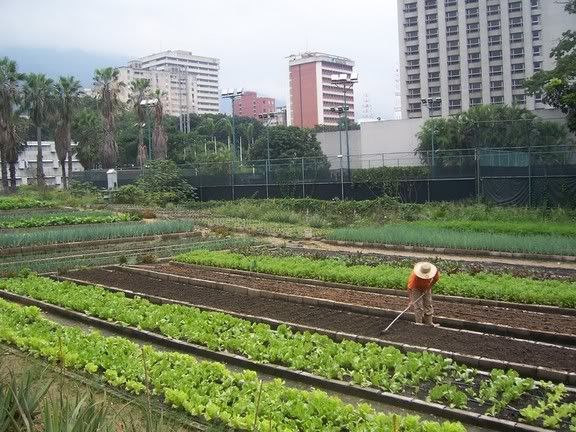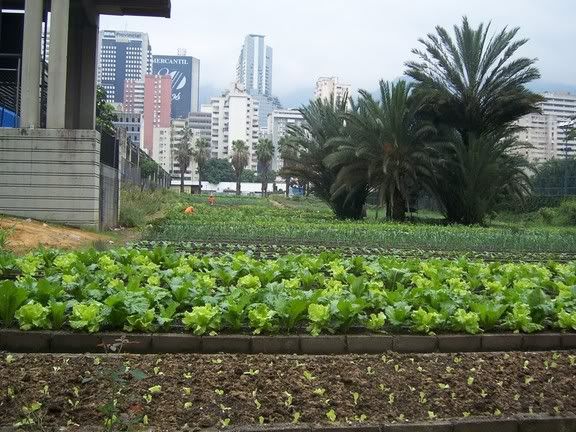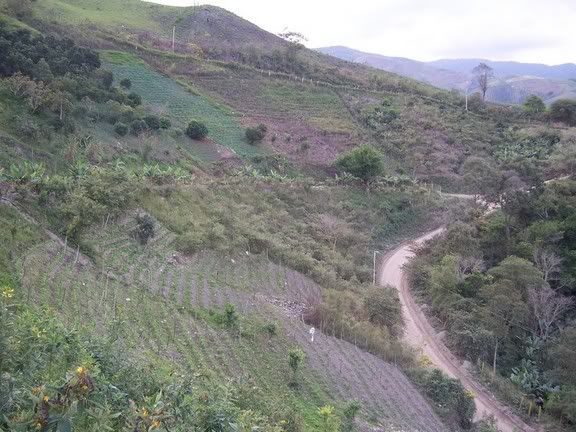Saturday, December 17, 2005
Urban farming
On the post about Mercal the question came up of Venezuelan agricultural self-sufficiency and what, if anything, they are doing to reclaim good farmland. As it is Venezuela imports the majority of its food (it has for a long time) and has relatively little arable land (4% of Venezuelan land is arable versus 19% for the United States for example).
Moreover, much of the land that was once prime farm land has now been gobbled up by urban areas. The valley in which Caracas resides is a prime example of this. It is very good land with abundant rainfall. I saw a picture of Caracas from 1948 that showed it looking east from where the Central University is. In that picture it was just farms with scattered homes. Now that area is just a huge urban jungle with huge skyscrapers and no open space left. So with every year that passes Venezuela probably has fewer areas left for farming.
Nevertheless attempts have been made to reclaim at least some land. For example, right in the heart of Caracas, next to the huge Parque Central office and housing complex, some open space has been turned into a medium sized farm where they are cultivating various vegitables. Here are a copule of pictures of it:


Given its location this farm is completely fenced off and I didn't get the chance to talk to any of the farmers about what they are growing and what they do with what they produce. So while it looked interesting its hard to know what kind of an impact these efforts have. Further, I didn't see any other similiar urban farming efforts so I don't know how widespread these efforts are. Nevertheless, this does show the Venezuelan government isn't simply sitting on its hands in the face of its land shortage.
And just to show what leangths Venezuelan's go to to farm here is a picture of part of a farm outside the town of Rio Claro in the state of Lara. The picture doesn't capture it that well but these slopes, where they were farming everything from onions to papaya and bananas, were very steep. It was hard to walk up and down them and there is no way they can use tractors on them. All plowing is done with oxen. This type of land simply wouldn't be farmed in the United States but in Venezuela it is. Venezuelan's may not grow most of their own food but it certainly isn't for lack of trying.

|
Moreover, much of the land that was once prime farm land has now been gobbled up by urban areas. The valley in which Caracas resides is a prime example of this. It is very good land with abundant rainfall. I saw a picture of Caracas from 1948 that showed it looking east from where the Central University is. In that picture it was just farms with scattered homes. Now that area is just a huge urban jungle with huge skyscrapers and no open space left. So with every year that passes Venezuela probably has fewer areas left for farming.
Nevertheless attempts have been made to reclaim at least some land. For example, right in the heart of Caracas, next to the huge Parque Central office and housing complex, some open space has been turned into a medium sized farm where they are cultivating various vegitables. Here are a copule of pictures of it:


Given its location this farm is completely fenced off and I didn't get the chance to talk to any of the farmers about what they are growing and what they do with what they produce. So while it looked interesting its hard to know what kind of an impact these efforts have. Further, I didn't see any other similiar urban farming efforts so I don't know how widespread these efforts are. Nevertheless, this does show the Venezuelan government isn't simply sitting on its hands in the face of its land shortage.
And just to show what leangths Venezuelan's go to to farm here is a picture of part of a farm outside the town of Rio Claro in the state of Lara. The picture doesn't capture it that well but these slopes, where they were farming everything from onions to papaya and bananas, were very steep. It was hard to walk up and down them and there is no way they can use tractors on them. All plowing is done with oxen. This type of land simply wouldn't be farmed in the United States but in Venezuela it is. Venezuelan's may not grow most of their own food but it certainly isn't for lack of trying.

|
